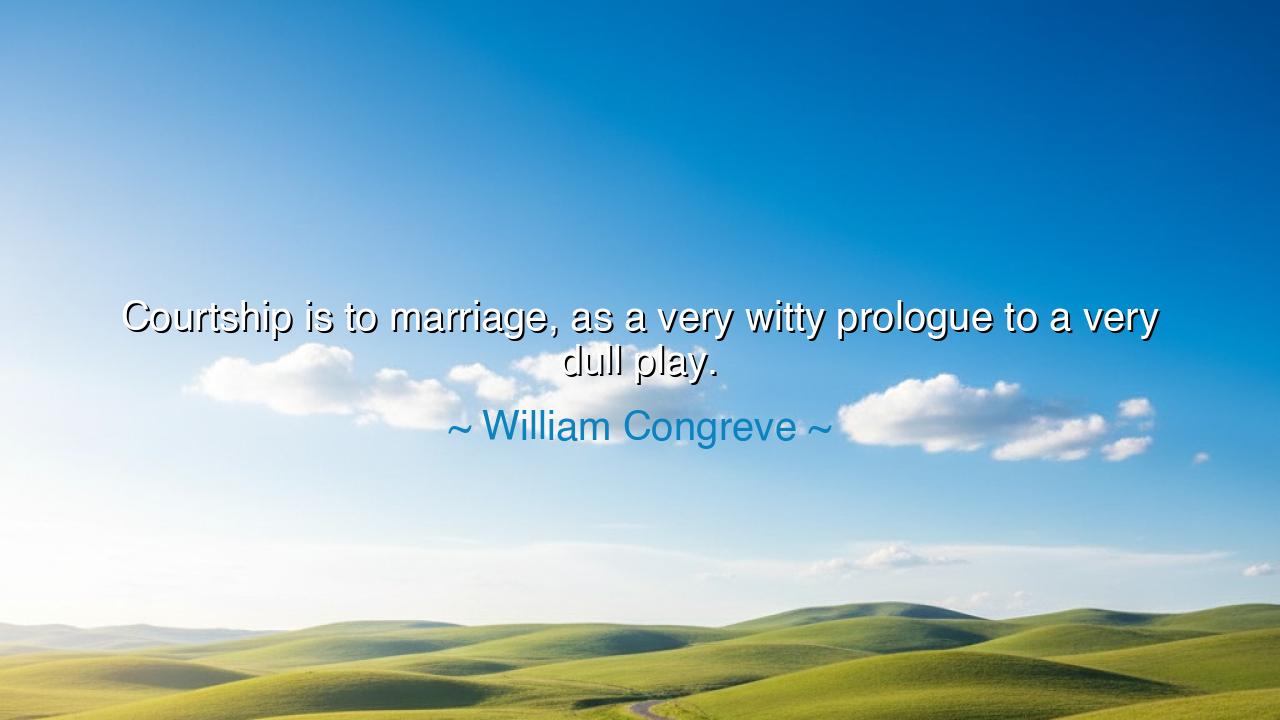
Courtship is to marriage, as a very witty prologue to a very dull






The playwright William Congreve, sharp of wit and subtle of heart, once wrote: “Courtship is to marriage, as a very witty prologue to a very dull play.” These words, though wrapped in jest, speak with the voice of experience — the laughter of one who has watched the bright flame of romantic illusion fade into the smoke of daily reality. Yet behind his humor lies a timeless wisdom: that love, like all things living, changes its form when it passes from the garden of promise into the fields of endurance.
In courtship, the world is a stage of wonder. Every word is music, every glance a spark, every flaw veiled by the fragrance of hope. It is the season of the heart’s imagination, when two souls write poetry in one another’s presence. This is the “witty prologue” that Congreve speaks of — charming, clever, and filled with delight. But when marriage begins, the curtain rises upon a different kind of story — not one of laughter and pursuit, but of patience, of understanding, of labor shared beneath the weight of the ordinary. Thus, the “dull play” is not dull because it lacks meaning, but because it demands endurance rather than enchantment.
The ancients, too, knew this truth well. In the Greek myths, the goddess Aphrodite was radiant in her allure, the very embodiment of desire; but Hera, goddess of marriage, was heavy with duty and command. Between them lies the same contrast Congreve saw — between passion that burns and partnership that sustains. One dazzles the eyes, the other tests the soul. Many chase Aphrodite and fear Hera, but the wise learn that love requires both — the shimmer of joy and the steadiness of devotion.
Consider the story of Napoleon and Josephine. Their courtship was a storm of letters, passion, and longing; the emperor wrote to her as though to the sun itself. Yet in marriage, their brilliance dimmed beneath the demands of empire, the cold weight of politics, and the slow erosion of shared time. Their love was real — but it was unprepared for the transformation from romance to responsibility. What was once poetry became prose, and neither could bear the shift. Thus, Congreve’s observation becomes not mockery, but warning: that we must learn to love not only the charm of the beginning, but the quiet persistence of the middle and the end.
Yet there is another way to read Congreve’s words — not as despair, but as invitation. For every “dull play” can be made radiant by those who act within it. If courtship is the prologue, then marriage is the masterpiece waiting to be written. The wit of the beginning may fade, but in its place comes something deeper — familiarity, loyalty, peace. The laughter of youth becomes the companionship of age, and though the music softens, its melody endures. The lovers who can find beauty in the daily, who can delight in the simple rather than mourn the lost spark, are those who turn Congreve’s irony into triumph.
It is said that Marcus Aurelius, the Roman emperor and philosopher, rose each morning beside his wife Faustina and thanked the gods for the privilege of her presence — even when the fires of passion had cooled. “Love,” he wrote, “is not the absence of fatigue, but the will to act rightly despite it.” This is the secret Congreve’s jest conceals: that what seems dull to the careless heart becomes sacred to the faithful one.
So, my child of the future, take heed. Do not fall in love with the prologue and forget to write the play. The courtship may dazzle, but the marriage will shape your soul. Speak kindly when the laughter fades; serve one another when the thrill is gone. Build not only on desire, but on respect, humor, and endurance — for these are the true pillars of lasting love.
And when, in later years, you find yourself sitting beside the same face you once adored with youthful fire, remember Congreve’s wisdom — and smile. For if the play of marriage feels dull to the impatient, it glows with quiet brilliance to the wise. To live in love’s endurance is to partake in something divine — a story not of wit alone, but of truth, patience, and eternity.






AAdministratorAdministrator
Welcome, honored guests. Please leave a comment, we will respond soon